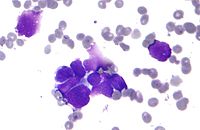
Photo from wikipedia
Background: Characterisation of molecular alterations of pleomorphic lobular carcinoma (PLC), an aggressive subtype of invasive lobular carcinoma (ILC), have not been yet completely accomplished. Methods: To investigate the molecular alterations… Click to show full abstract
Background: Characterisation of molecular alterations of pleomorphic lobular carcinoma (PLC), an aggressive subtype of invasive lobular carcinoma (ILC), have not been yet completely accomplished. Methods: To investigate the molecular alterations of invasive lobular carcinoma with pleomorphic features, a total of 39 tumour samples (in situ and invasive lesions and lymph node metastases) from 27 patients with nuclear grade 3 invasive lobular carcinomas were subjected to morphological, immunohistochemical and massive parallel sequencing analyses. Results: Our observations indicated that invasive lobular carcinomas with pleomorphic features were morphologically and molecularly heterogeneous. All cases showed absence or aberrant expression of E-cadherin and abnormal expression of β-catenin and p120. CDH1 (89%), PIK3CA (33%) and ERRB2 (26%) were the most common mutated genes. ERBB2 mutations preferentially affected the tyrosine-kinase activity domain, being the most frequent the targetable mutation p.L755S (57%). We also observed higher frequency of mutations in ARID1B, KMT2C, MAP3K1, TP53 and ARID1A in PLC than previously reported in classic ILC. Alterations related to progression from in situ to invasive carcinoma and/or to lymph node metastases included TP53 mutation, amplification of PIK3CA and CCND1 and loss of ARID1A expression. Conclusions: The high frequency of ERBB2 mutations observed suggests that ERBB2 mutation testing should be considered in all invasive lobular carcinomas with nuclear grade 3.
Journal Title: Cancers
Year Published: 2019
Link to full text (if available)
Share on Social Media: Sign Up to like & get
recommendations!